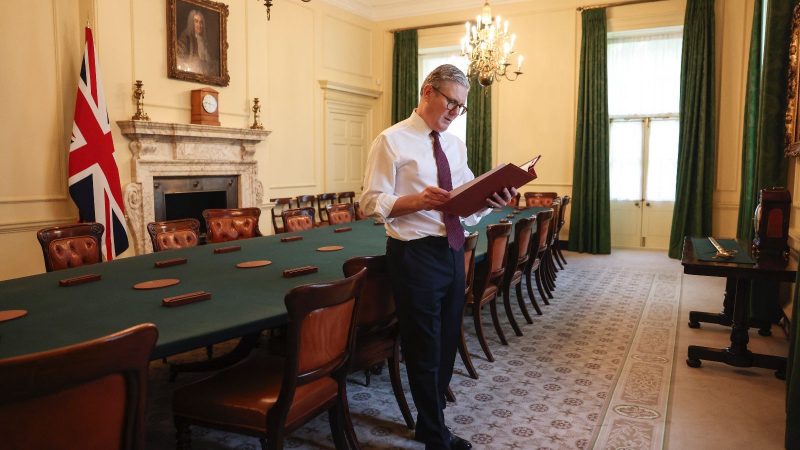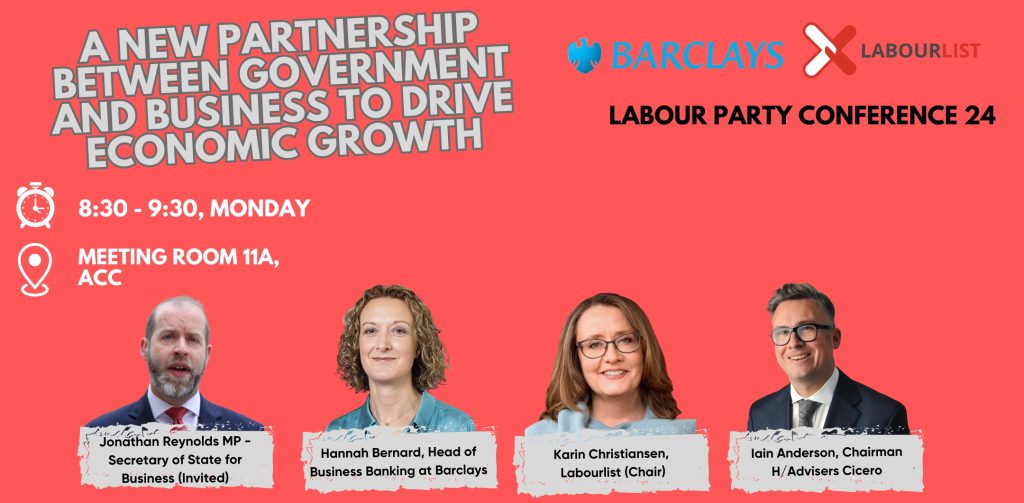
A picture might speak a thousand words but sometimes a few choice numbers can tell a story.
So, here’s three shockers: 0.7 percent, £1,200 and £2.7 trillion.
The first decimal is the appalling rate of UK economic growth this year; the second stat is how much poorer families are compared to 2019, and the last is, of course, the mind-blowing level of the national debt. Together, the terrible tale of these disastrous digits is of the broken economic model the new government has inherited from the Conservatives.
For years, the Tories tried to persuade us a demand side model of growth would somehow work. Keep slashing taxes they argued, and the investment would come. Except it never did. And so, whereas once upon a time in New Labour’s day, the UK’s trend rate of growth was over 2 percent, now, thanks to the ABC of Tory economics – austerity, Brexit, and chaos – our economy is growing far more slowly.
That is why Rachel Reeves is right to set her sights, not on more-of-the-same demand side policies but what the Americans call, modern supply side: smart investment in science, innovation, skills, low-carbon power and grid connections to it, plus a bigger supply of investment capital marshalled by public and private banks that crowd in private investment and a planning system that helps, not hinders, the business of actually building.
This is a very different economic model designed to raise both growth and inclusive growth. But three dilemmas now lie ahead and they will play out as a Budget, a spending review and several key bits of legislation come to the House of Commons.

‘Restoring fairness to tax system without scaring private investors’
First, the Chancellor has to at once and at the same time both restore fairness to the tax system and yet not scare witless the private investors whose animal spirits are so important to reviving economic growth. It is obviously bonkers that Rishi Sunak pays a tax rate of 23 percent on an income of £2 million when one in five taxpayers are contributing one pound in every five they earn to HMRC.
Capital gains tax should go up. We should look at asking individuals to pay national insurance contributions in investment income. We should close the ludicrous loopholes in inheritance tax. We might also look at a windfall tax on the 22,000 largest fortunes that have just boomed thanks to £1 trillion of taxpayer backed quantitative easing since March 2009. Yet we must do all this while getting the balance right between fairness and the lure of a decent return from new and sometimes risky investment. Not easy. But absolutely necessary.
‘Thinking for the long-term, but without surrendering short-term performance’
Second, we have to shift our firms to thinking for the long term, without surrendering short-term performance. This is going to take reform on two fronts. On the one hand, we need fewer but bigger pension fund investors – as in Canada and Australia – that are equipped to be far better stewards of the money they invest in our behalf.
But on the other hand, we need to fix our broken board rooms and ensure we have corporate captains on the deck more inclined to take decisions for the long term, rather than betting the house on a quick buck. Couple this with some proper rights at work for workers and we’ve the making of significant change. But let’s not pretend it will not entail a degree of disruption and therefore may require us to proceed with both resolution and care.
READ MORE: ‘Five lessons the UK can learn from America in pursuit of clean energy’
‘Radical devolution to regional mayors’
The third dilemma is perhaps the hardest. Everything I learned as a Cabinet minister convinced me that we need to radically devolve power to mayors around the country. It is more true today. Whitehall’s circuits are overloaded. The world today requires the centre to focus far more on geopolitics, defence, diplomacy and development. It hasn’t got the bandwidth – or the expertise – to worry about the unit costs of training at Dudley College as well. Nor do Whitehall departments work well joining budgets together.
Yet innovation tends to be found in the grey space between departments and is best unlocked by budgets that are pooled. Whitehall finds this near impossible. The defence of turf is an instinct too strong to conquer no matter how many mission boards you appoint.
Devolving economic power, spending decisions along with planning and borrowing powers and getting Whitehall out of the weeds of local decision-making is a far better way to get good decisions made faster. But, let’s admit it comes with a frustration – often felt by prime ministers I have worked for – that they can’t ’pull a lever’ and ‘get something done.’ In fact they can. Prime ministers put the kinetic energy into the business of change. Mobilising a devolved system isn’t impossible. It just means working differently.
‘Prizes of the next decade of change must be fairly shared’
The prize of this new agenda could be enormous. But it will be contested. And that is why we will need our leaders to tell a bigger, bolder story about where we’re going and why. Yet the changes in the next decade will be extraordinary – advent of AI, the arrival of global gigabit connectivity, the shift to green energy, the genetic revolution in medicine, another billion people joining the global middle class. These are extraordinary changes that will account for just the first step in what could be a thirteen-fold increase in living standards over the century ahead. But if these prizes are to change the lives of all, then they must be fairly shared. And that is the kind of task for which we invented the Labour Party.
SHARE: If you have anything to share that we should be looking into or publishing about this story – or any other topic involving Labour– contact us (strictly anonymously if you wish) at [email protected].
SUBSCRIBE: Sign up to LabourList’s morning email here for the best briefing on everything Labour, every weekday morning.
DONATE: If you value our work, please donate to become one of our supporters here and help sustain and expand our coverage.
PARTNER: If you or your organisation might be interested in partnering with us on sponsored events or content, email [email protected].




More from LabourList
‘As metro mayors gain power, Labour must tighten political accountability’
Letters to the Editor – week ending 22 February 2026
‘The coastal towns where young people have been left behind by Whitehall’